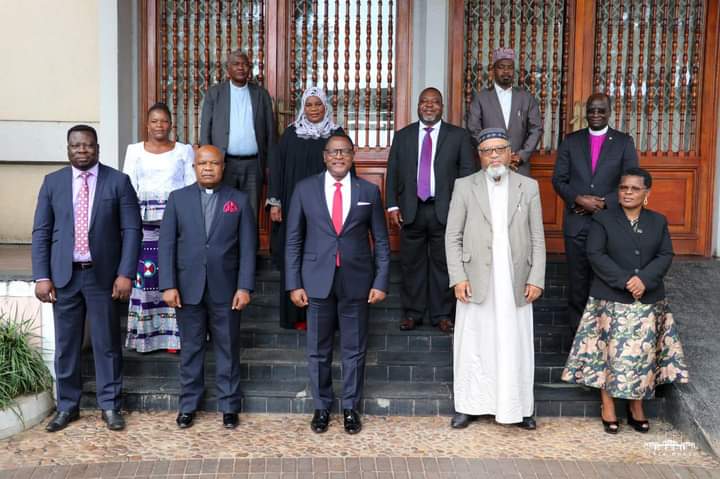By NyasaAuthor1 Reverend Fanuel Emmanuel
The Public Affairs Committee (PAC), once hailed as Malawi’s moral voice and conscience, is now steeped in controversy — its executive committee clinging to power unlawfully for nearly three years, after their constitutionally-mandated term expired in December 2022.
President Chakwera with illegal PAC members
At the center of the storm is Monsignor Patrick Thawale, who continues to chair a committee that has long overstayed its legal welcome. Elected in December 2019 for a three-year term, the current PAC executive has no fresh mandate from member organisations, yet remains firmly in office. What was once a champion of democratic accountability is now accused of institutional hypocrisy, moral compromise, and outright illegality.
An Embarrassing Fall from Grace
The very organisation that rose to prominence for facilitating Malawi’s transition to democracy in the 1990s — confronting then-President Hastings Kamuzu Banda’s dictatorship and resisting President Bakili Muluzi’s third-term ambitions — now finds itself tangled in the very undemocratic tendencies it once rebuked.
Governance experts are not mincing words.
“PAC rebukes political parties for clinging to power and failing to conduct internal elections. But now PAC itself is the villain,” said governance advocate Mavuto Bamusi. “They’ve lost the moral high ground. They must urgently organise elections and give Malawians a new, legitimate leadership.”
A Dubious Constitutional Loophole
Pressed on the issue, PAC’s Board of Trustees — chaired by Reverend Fanuel Emmanuel Magangani — insists it acted within the law when it renewed the mandate of the expired executive. According to Magangani, Article 15.4 of the PAC Constitution allows the existing executive to “continue to transact business” in the absence of a newly elected committee.
Magangani argued that the extension was necessary to allow the executive to complete crucial pending tasks — most notably, the revision of the PAC constitution and the convening of a long-overdue All-Inclusive Stakeholders’ Conference, which he claims is critical in shaping the organisation’s future.
“The Board made the decision for the sake of PAC’s continuity. We relied on constitutional provisions to keep the executive in place until these processes are complete,” Magangani said in a written response.
But critics are not buying it.
“That clause is bad law. You cannot use it to justify an indefinite extension of power,” said Bamusi. “This is the same PAC that opposed Muluzi’s third term. You can’t oppose lifetime rule and then import it into PAC through the backdoor.”
Excuses and Inaction
According to Magangani, the All-Inclusive Stakeholders’ Conference and the Annual General Meeting (AGM) were supposed to happen in early 2024. But now, in the second half of 2025, there is still no sign of either event taking place. PAC’s silence on the matter is deafening.
When asked about the status of the AGM and conference, PAC Executive Secretary Robert Phiri deflected responsibility, saying only the trustees’ chairperson could comment. Magangani, on the other hand, claimed that further details would come from the publicity secretary — a cycle of bureaucratic passing-the-buck that smacks of delay tactics and intentional opacity.
Governance watchdogs see through the smokescreen.
“This is a classic case of poor governance,” said Willy Kambwandira, Executive Director for the Centre for Social Accountability and Transparency (Csat). “PAC should lead by example. Right now, they are doing the opposite. They are operating without a mandate, and their silence amid Malawi’s political and economic crisis is extremely disappointing.”
Kambwandira warned that the prolonged absence of legitimate leadership undermines PAC’s credibility and raises serious concerns about selective activism and possible conflict of interest.
Who’s Still in Power?
The current executive committee — operating without a fresh mandate — includes:
Monsignor Patrick Thawale (Chairperson)
Osman Karim (Vice-Chairperson, re-elected)
Rev. Father Mark Mkandawire (Board Secretary)
Bishop Gilford Matonga (Publicity Secretary)
Rev. Davidson Chifungo (Treasurer)
Rev. Matilda Matabwa, Agnes Kamoto, Sheikh Jaffar Kawinga, and Rev. Maureen Tinenenji (Executive Members)
This committee continues to speak on national matters. In November 2023, they released a public statement after meeting President Lazarus Chakwera, urging him to act decisively on the country’s economic hardships. Ironically, the same group calling for leadership reform is itself clinging to expired authority.
A Historic Institution on the Brink
Formed in 1992 as a vehicle for dialogue during Malawi’s shift to multi-party democracy, PAC brought together diverse religious institutions with a common mission: defend rights, foster dialogue, and promote accountability. Founding members include:
CCAP Synods (Blantyre, Livingstonia, Nkhoma)
Anglican Dioceses
Episcopal Conference of Malawi
Muslim Association of Malawi
Malawi Council of Churches
Malawi Law Society
Evangelical Association of Malawi
Providence Industrial Mission
Zambezi Evangelical Church
Baptist Convention of Malawi
Christian Health Association of Malawi, among many others
But today, the grouping finds itself at odds with its founding values. Its extended silence, evasive leadership, and legal gymnastics have betrayed the public trust it once enjoyed.
Time to Clean House
The writing is on the wall. The moral authority PAC once commanded is crumbling under the weight of its own internal contradictions. If it wants to remain relevant and respected, it must act.
“This is not just an administrative oversight,” said Chingaipe. “It’s a full-blown governance failure. PAC must organise elections. Now.”
Malawians are watching. And until PAC can walk the talk, its sermons on good governance will ring hollow.
Sharing is caring!
